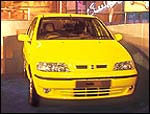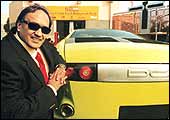 |
| Mercedes SLK: that wind swept feel |
 |
| Fiat's Palio Sports: extension or the
real thing? |
Last year, an announcement
by Porsche, fabled for its sports cars, that it planned to enter
the sports utility vehicle segment, surprised the market and enraged
Porsche owners. The market was concerned that the move would dilute
Porsche's brand equity. The second lot was simply hurt.
This is an indication of the passion sports
cars generate. This passion is also perhaps the reason why sports
cars command a high degree of loyalty among consumers, but don't
attract too many of them.
Going by last month's Auto Expo, car-makers
are trying to prise open this loyal market, however small, in India.
On display were Fiat's Palio Sports, Mercedes' SLK, Indica Sports
and Aria coupe Tata Engineering's, and several other specimens of
the sports car family. Maruti, which kept away from the Expo organised
its own little show in the capital's Ansal Plaza, placing a Rally
Esteem, Rally Gypsy, and even a Rally 800 on stage.
However, a closer scrutiny of all models on
offer reveals that Mercedes SLK is perhaps the only one that qualifies
for the label of a true sports car. It offers significantly higher
performance over the comparable S Class. One is not sure about Aria:
it has remained a concept for some time. The rest of the so-called
sports models have the same engine as the regular models.
''These are not really sports cars. The hallmark
of a sports car is performance,'' says Randy Shockley, vice president
(sales & marketing), Ford India, which has itself been selling
a 'rally sports' model of its Ford Ikon with no change in the engine.
The only change in these cars is in their looks-a
tad sportier than the standard models. Now, why would companies
want to call them sports cars and risk offending customers?
-Suveen K. Sinha
UPGRADE
Fog On The Windshield
Things could improve for the tech sector, but
only by looking at the big picture-and gazing east.
 |
| Indian software: Pink slip parties, gravity-prone
billing rates, and scarce business |
What's
ahead for Indian software? A clue comes from the strong performance
of two multinational biggies: Siebel Systems Inc., and Germany's
sap. Siebel makes software that helps businesses sell more efficiently
to customers, while sap makes software that automates everyday business
operations such as payroll and human resources. Both greatly pleased
Wall Street investors in end-January. On January 23, Siebel said
it saw earnings and key revenues growing in 2002, despite a 17 per
cent fall in fourth-quarter profits from a year earlier.
The companies that are likely to rebound then
are those that focus on getting customers leaner and meaner. Wall
Street is applauding those who put up strong numbers and raise guidance.
Some smaller companies too have done well, mainly those who managed
to tap the growing business-financial services and mobile communications-in
China and Korea.
Pricing was always a strong point for India's
software industry but the year of turmoil has put unprecedented
pressure on that advantage. Satyam Computer Services, dropped prices
by two per cent and raised volumes by three last quarter-but profit
dropped 11 per cent and sales two per cent. That pretty much tells
the story.
The strong brand name of Infosys Technologies,
the second largest software exporter, did not help as the company
too raised volumes by three per cent-the same as numero uno Wipro-only
by beating down its prices. The US, where 60 per cent of India's
software exports go, is firmly a buyers market: not only are existing
deals being made cheaper, new deals are being closed at lower prices.
So while Indian tech firms continue adding new clients, those clients
are coming at rock-bottom prices. It could be time to look at the
big picture-and gaze East.
-Samar Halarnkar
THE BIG IDEA
Wouldn't it be
great if you could send SMS on your landline? Now there's an idea
for BSNL, MTNL and the host of private operators looking to grow
the telecom business in India. Well, it's now technically possible
to send text from landlines. In the UK, British Telecom is now offering
the service on landlines-the first such worldwide-using the technology
that displays caller ids. Actually cellphones are better suited
for text than landlines. Mobile operators offer text by squeezing
in short messages in the unused space in control channels that networks
use to make voice calls. However, landlines don't have such channels.
What BT has done is to ride messages on modem-like tones that send
the number of the caller to your phone. To use BT's service, you
need a special phone. BT's Rs 7,000 digital cordless phone adds
text messages to the caller id tones and can send a text message
to a cellphone or to a similar landline. The system-just approved
for use by the European Telecommunications Standards Institute-can
only send text to a cellphone on BT's cell network, but others in
Germany, Italy and Britain itself are planning to get connected.
-Samar Halarnkar
MAKE-UP
Another DC Superhero
There's nothing toonish about Dilip Chhabria's
designs.
 |
| Dilip Chhabria: high on design |
The man's designs
may have taken the back seat to the he-did-he-didn't issue of designer
Dilip Chhabria selling a stake in his eponymously named dc Designs
to Shankar Sharma, who in turn sold it to HFCL (Chhabria insists
he sold it straight to HFCL), but fact is, the company is on a high.
At the sixth auto expo, dc's stall had more
concept vehicles on display-six of its own, and four in collaboration
with Kinetic, Bajaj Tempo, Ford, and Toyota-than the stalls of the
car majors.
Then, there is Chhabria's hush-hush small car
project for an as yet unnamed South American government. ''It is
in the feasibility stage and the government will pick up all the
costs,'' is all he is willing to divulge.
Now, the man who entered the business inadvertently
in 1993, when he made some modifications to his Maruti Gypsy, is
hoping to leverage this association to expand his company's operations
to Europe and compete against leading Italian design houses in just
about all product categories, not just cars.
That's an audacious gambit: Third World governments
trusting you with the taxpayer's money is one thing; succeeding
in the intensely competitive European design market, quite another.
But dc seems to have ably marketed its design-skills in categories
other than auto in India. Today, the company boasts assignments
from Godrej, VIP, and Whirlpool for products as diverse as washing
machines and microwaves. Will that be enough to buy it a passport
to Europe? Chhabria sure thinks so.
-Vinod Mahanta
 |
| The taming of the cable guy |
WIRED
Come Together
Broadcasters realise the power of distribution.
For
execs at most television channels, cable guys, who routinely under-report
the number of subscribers, are far more obnoxious than Jim Carrey's
portrayal of one. Now, television companies are realising that by
forming a larger axis of broadcasters they just might be able to
get the cable trade to behave. Recently, Zee Telefilms formed a
distribution joint-venture with Turner International (India), Zee
Turner, to distribute a bouquet of 17 channels. Star Television
network does eight, and Sony, four. That's good news for independent
channels like Aaj Tak and Discovery: distribution ventures woo independents
in an effort to make their bouquet more attractive. At stake is
the dominance of the Rs 6,000-crore cable subscription market, which
is expected to nearly treble, to Rs 17,000-crore, by 2005. That's
no chump change.
-Shailesh Dobhal
OBITUARY
Run Out
More than Sachin's agent.
 |
| Mark Mascarenhas: 1957-2002 |
He'll
no doubt be best remembered for building brand Sachin, but Mark
Mascarenhas didn't do too bad a job with WorldTel either. Few in
India had heard about him before the cricket World Cup of 1996.
He bagged the telecast rights for the event. After producing soccer,
boxing, cycling, and skiing events in the US that was his biggest
break. Today, the future of WorldTel remains unclear. Will sister
Jeanne Verghese who operated out of the WorldTel Bangalore office
keep it going?
Inevitably, controversy courted Mascarenhas'
deals with Doordarshan. Investigations duly followed, but none of
the charges about the deal being fixed in his favour stuck. Question
marks may hover over his deals, but they won't be enough to cloud
the stamp the affable Mascarenhas left on Indian cricket. Ask the
Indian cricketers: they wore black armbands when playing England
a day after his freak death.
-Brian Carvalho
|

